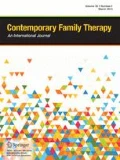Abstract
This is a report on a combined therapy and research project conducted with a seriously criminal population in Swedish prisons and using a Solution-Focused Brief Therapy approach with a focus on networks. Recidivism was significantly lower and less serious among experimental group participants. A case study is included.
Similar content being viewed by others
REFERENCES
Berg, I. K. Familjebehandling, losningsfokuserat arbete med utsatta familjer. Stockholm: Mareld.
de Shazer, S. (1984). The death of resistance. Family Process, 23, 11–17.
de Shazer, S. (1991). Putting difference to work. New York: Norton.
Furman, B., & Ahola, T. (1988). Ficktjuven pa nudistlagret. Helsinki: Ai-Ai.
Furman, B., & Ahola, T. (1990). Losningar for missbrukare. Stockholm: Mareld.
Furman, B., & Ahola, T. (1988). Solution talk: Hosting therapeutic conversations. New York: Norton.
George, E., Iveson, C., & Ratner, H. (1990). Problem to solution: Brief therapy with individuals and families. London: B. T. Press.
Korman, H., & Soderquist, M. (1991). Familjeterapi I ursprungsfamiljen vid kronskt intravenost missbruk. Preliminary report. Socialsystrelsen. Stockholm.
Mason, B. (1989). Handing over: Developing consistency across shifts in residential and health settings. London: D & C Publishing.
O'Hanlon, W. H., & Weiner-Davis, M. (1989). In search of solutions. Ontario: Penguin Books Canada.
Petit, B., & Olson, H. (1992). Om svar anhalles. Stockholm: Mareld.
Selvini Palazzoli, M., Boscolo, L., Cecchin, L., & Prata, G. (1982). Paradox och motparadox. Stockholm: Natur och Kultur.
Soderquist, M. (1985). Heroinister familjen och terapeuten: En ny syn pa φpiatmissbruk och behanding. Fokus pa Familjen, 13, 157–173.
Soderquist, M., & Korman, H. (1989). The therapy failed but the patient succeeded. Family Therapy Case Studies, 4(1), 51–58.
Svedham, L., et al. (1985). Natverksterapi, teori och praktik. Stockholm: Carlsson Bokforlag AB.
Tomm, K. (1989). Systemisk intervjumetodik. Stockholm: Mareld.
Watzlawick, P., Weakland, J., Fisch, R. (1974). Change: Principles of problem formation and problem resolution. New York: Norton.
White, M. (1991). Nya vagar inom den systemiska terapin. Stockholm: Mareld.
Author information
Authors and Affiliations
Rights and permissions
About this article
Cite this article
Lindforss, L., Magnusson, D. Solution-Focused Therapy in Prison. Contemporary Family Therapy 19, 89–103 (1997). https://doi.org/10.1023/A:1026114501186
Issue Date:
DOI: https://doi.org/10.1023/A:1026114501186


